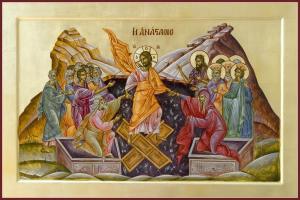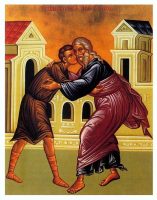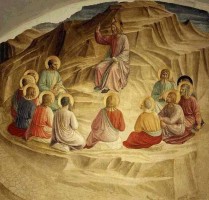Sermon on Acts 1:6-11
6 When they therefore were come together, they asked of him, saying, Lord, wilt thou at this time restore again the kingdom to Israel?
7 And he said unto them, It is not for you to know the times or the seasons, which the Father hath put in his own power.
8 But ye shall receive power, after that the Holy Ghost is come upon you: and ye shall be witnesses unto me both in Jerusalem, and in all Judaea, and in Samaria, and unto the uttermost part of the earth.
9 And when he had spoken these things, while they beheld, he was taken up; and a cloud received him out of their sight.
10 And while they looked stedfastly toward heaven as he went up, behold, two men stood by them in white apparel;
11 Which also said, Ye men of Galilee, why stand ye gazing up into heaven? this same Jesus, which is taken up from you into heaven, shall so come in like manner as ye have seen him go into heaven.
“Lord, Tell us about our political future. Will you intervene directly into our political reality? Will you fulfill our political expectations, vanquishing our oppressive foes and taking care of your chosen people? Lord, will you take care of our real or perceived problems for us?” “Lord, at this time will you restore the Kingdom to Israel”. We want a King, someone to make life easy, to take charge when things get tough, someone to blame when things go wrong, someone to vanquish our enemies and gloriously reign in political worldly power, making our position comfortable, secure, or even exalted.
In a certain sense, it’s normal to want this. It’s a sign of faith to believe that our God can provide earthly solutions to our earthly problems. But it’s also a bit misguided. God rarely works the way we want him to, rarely granting us magic solutions, an “A” on an exam we didn’t study for or a date with a pretty woman we’ve never mustered up the courage to speak with. And when we look at the “kings” in our lives, from Church leaders to parents, politicians, and celebrities, we are almost left disappointed. The Psalms are so often proved right “trust not in princes and in sons of men, in whom there is no salvation.” We all, following the Israelites and the Apostles, fail to recognize God as King in our lives and the implications of being citizens of His royal city.
In many ways, the Old Testament is the story of a King, His City and its God. When the Prophet Samuel was growing old, Israel asked him to appoint a King to replace him in his old age, to lead the people, to take care of them, to solve their problems. God tells Samuel ““Listen to all that the people are saying to you; it is not you they have rejected, but they have rejected me as their king. As they have done from the day I brought them up out of Egypt until this day, forsaking me and serving other gods, so they are doing to you. Now listen to them; but warn them solemnly and let them know what the king who will reign over them will claim as his rights.”[1] And Samuel, being the dutiful prophet of the Most High God goes and tells the people what it will mean for them to have an earthly king.

Samuel the Prophet
Samuel tells the Israelites how bad having an earthly King will be for everyone, how the taxes will pile up and pile up, how he will wage war and decimate their families. And the people replied to Samuel’s warning “We want a king over us. Then we will be like all the other nations, with a king to lead us and to go out before us and fight our battles.”[2] We want to be like everyone else, we want someone to fight for us and lead; we want a lobbying group, an advocate, a voice in the marketplace of the world-wide city. We want political solutions to our problems, just like everyone else. Israel didn’t do so well with its kings, because the citizens of God’s kingdom are not like everyone else.
An unnamed apostle in the beginning of the book of Acts falls into the same error as early Israelites with Samuel. Imagine the setting, Christ is preparing His Apostles for their earthly ministry, about to give his last word to them before His Glorious Ascension, and one of his closest followers dares to ask him “Lord, at this time will you restore the Kingdom to Israel?”[3] “Lord will you give us back that King you didn’t want us to have in the first place?”
When asked if his followers will again gain political power and a degree of control over their station in life, Christ instead prophesies their very martyrdom. This passage from Acts can read “And you shall be my [martyrs] in all Judea and Samaria, and to the end of the earth.”[4] In Greek the word for martyr and witness are the same, perhaps even interchangeable. And what else is the rest of the book of Acts than a chronicle of that early witness, that early martyrdom, from the stoning of Stephen to the death of Paul in Rome.
In the Eastern Orthodox tradition, we read this passage from Acts on Easter Morning, during our vigil that goes from midnight to dawn. About 1:30am, after the faithful have already been singing hymns and exchanging festal shouts of “Christ is Risen!” for over an hour, we all hear this passage from Acts. Celebrating the ineffable joy of the Risen Lord, we hear His call to martyrdom, to witness all over the world for His sake. Why then? Because it is only in the light of Christ’s incarnation, death, and resurrection that our suffering, our martyrdom, any aspect of our witness has meaning.
Christ is risen, and every selfless act, each moment of human suffering and martyrdom now has meaning because death itself is conquered, and the pathway to eternal life in Christ’s kingdom is opened to anyone who wants it through the selfless suffering of an innocent man. Christ our King, is not like other kings, showing his power through force, but revealing his power in perfect weakness, by the rising again from death on the cross. Just as our king is not like other kings, we as citizens are not like the citizens of earthly Kingdoms.
Martyrdom is our call, following Christ’s admonition to be witnesses to Him, to follow our leader, our King, who selflessly gave his life for the life of the world. But we don’t live in Ancient Rome, we won’t be thrown to lions or crucified in a public spectacle. However, our mission is still the same: we are witnesses to the Great King, Christ our God, who was crucified under the charge “King of the Jews.” How, how can we give a compelling witness in our time and in our place? How can we be effective citizens of his self-sacrificial kingdom? Through death. We can only witness through our own death, whether figuratively or literally, for the sake of the other. We forget that even in our time and place, there are many people who consciously take the opportunity to lay down their lives for their neighbors, soldiers and policemen, civil servants, and even recently, in my home state of Connecticut, elementary school teachers. Most of us will never have to make such a dramatic decision. The true challenge is to prepare ourselves for such a physical or permanent sacrifice, by willingly offering ourselves as witnesses every day.

One of the Volunteer “Arlington Ladies”
I’m from a military family and I’ve had the blessing of attending funerals at Arlington National Cemetery from time to time. At Arlington, there are dozens of funerals a day. If you ever find yourself standing graveside during a funeral at Arlington, you’ll also see a well-dressed woman walk over to the grave escorted by a handsome, young enlisted man in dress uniform. She’ll stand reverently and silently for the service, and at the end she’ll come over to you, express her condolences, and hand you a hand-written card. These women, called “the Arlington Ladies”, volunteer their time, and have for decades, to make sure that there is a person present at every single funeral at Arlington, to make sure that none of our soldiers, sailors, or veterans is buried without someone there to express thanks for their service. These women, quietly and faithfully, day after day, offer a martyrdom of their own time, a sacrifice of it, for the sake of people they have never, and will never meet. They are true citizens of Christ’s Kingdom, following in the footsteps of the sacrificial King.
There’s another story I heard once. My friend is a pilot on an aircraft carrier. There are small prop planes that land on the carrier regularly to deliver mail, supplies, and people. His friend was piloting one of these planes in for landing with three passengers on board. As the plane was landing, the pilot noticed the engines failing. He quickly ordered the passengers to abandon the plane. He remained behind to keep the plane steady as they jumped to safety. This man, sacrificed his life for three others, and showed us what it means to be a citizen of God’s kingdom. I bet you didn’t hear that story on the evening news.
Another powerful example of martyrdom and witness comes from the Early Church. Ignatius was a Christian bishop in the Ancient city of Antioch at the end of the 1st Century, in the generation right after the apostles. The Apostle John was one of his teachers. Ignatius was arrested for being a Christian leader, and brought from Antioch (modern day Syria) to Rome to be killed by lions in the coliseum. On his way from Syria to Rome he wrote a lot of letters to his followers. My favorite one is where he tells people not to “spring” him from jail, but to let him die as a martyr, following in Christ’s footsteps, and therefore becoming a real human being full of life through his sacrificial death.
It is better for me to die in Christ Jesus than to be king over the ends of the earth. I seek him who died for our sake. I desire him who rose for us. The pains of birth are upon me. Suffer me, my brethren; hinder me not from living, do not wish me to die. Do not give to the world one who desires to belong to God, nor deceive him with material things. Suffer me to receive the pure light; when I shall have arrived there, I shall become a human being. Suffer me to follow the example of the passion of my God.[5]
Ignatius, he doesn’t see himself as a full human being, as fully alive in Christ, until the moment of his impending martyrdom, his impending witness to Christ by his public death in the Coliseum in Rome. Ignatius’s own identity decreases, he is no longer king of his own life, but follows obediently in the footsteps and identity of His crucified King.
 As Christians we celebrate the Resurrection of Christ not only on one Sunday in the springtime, but every Sunday. Likewise, we remember His crucifixion not only on Good Friday, but every Friday. When we gather together on a Friday in my tradition for the Divine Liturgy, for our communal celebration of the Holy Eucharist, we sing the psalm line “Yet God my King is from of old, working salvation in the midst of the earth.”[6] God showed us the true power of his kingship on the Cross, crucified as King of the Jews, and in doing so opened for all of us the path to salvation and eternal life in His Kingdom through our earthly actions. He made our salvation that day, but it’s up to us to respond to it in our own free will. As Christ works our salvation on the Cross, we tap into that same salvation when we sacrifice for others.
As Christians we celebrate the Resurrection of Christ not only on one Sunday in the springtime, but every Sunday. Likewise, we remember His crucifixion not only on Good Friday, but every Friday. When we gather together on a Friday in my tradition for the Divine Liturgy, for our communal celebration of the Holy Eucharist, we sing the psalm line “Yet God my King is from of old, working salvation in the midst of the earth.”[6] God showed us the true power of his kingship on the Cross, crucified as King of the Jews, and in doing so opened for all of us the path to salvation and eternal life in His Kingdom through our earthly actions. He made our salvation that day, but it’s up to us to respond to it in our own free will. As Christ works our salvation on the Cross, we tap into that same salvation when we sacrifice for others.
A famous preacher from my tradition said this when asked about when Christ will come again and establish the fullness of his Kingdom: “I know nothing about the ‘whens’ and ‘hows.’ But I know that in Christ… …the Passover of the world has begun, for Christ is risen and Life reigns.”[7] Christ our King is Risen, raising the world with himself. Our salvation has been created and worked in the midst of this world, in and through its imperfections, its tragedies, its suffering. Lord, reign in our hearts as King, and guide us to witness to your Kingdom here and now in this world, from Jerusalem, to Judea and Samaria, and to the ends of the earth.
Amen.
[1] 1 Samuel 8:7b-9 (NIV)
[2] 1 Samuel 8:19b-20 (NIV)
[3] Acts 1:6 (RSV)
[4] Acts 1:8 (RSV)
[5] Ignatius of Antioch, Epistle to the Romans as quoted in John Behr, The Way to Nicea (Crestwood,NY: Saint Vladimir’s Seminary Press, 2001), 92.
[6] Psalm 74:12 (RSV)
[7] 48. Thomas Hopko, “Two ‘Nos’ and One ‘Yes’” Saint Vladimir’s Seminary Quarterly, Vol. 28, No. 1, (1984) , http://www.schmemann.org/memoriam/1984.svtq8.hopko.html, (accessed January 28, 2013).


















